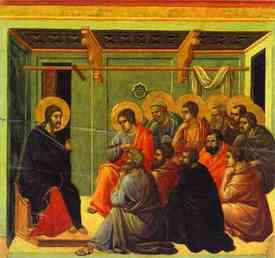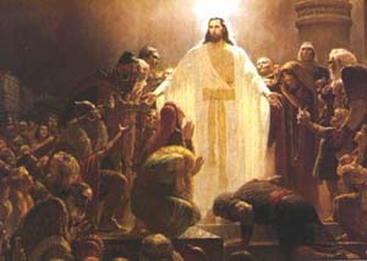
Sermon by St. Gregory the Pope
The first question to strike the mind when we hear this Gospel Lesson is: How was it that the body of the risen Lord was a real body, if it was able to pass through closed doors into the assembly of the disciples. But we ought to know that the works of God no longer seem wonderful when they are understood by man's reason, and that the worth of faith is lost as soon as the object of faith hath passed into the certainty of human demonstration. Nevertheless, those very works of our Redeemer which are in themselves impossible to be understood, must be thought over in connection with other of his works; so that wonderful things may be confirmed by things more wonderful still. The body of the Lord, which came into the assembly of the disciples through closed doors, was the same which, at its birth, had become manifest to the eyes of men in a wondrous way, by passing out of the cloister of the Virgin's womb without breaking the seal of her virginity. What wonder is it if that body which had come out of the Virgin's womb, without let to her virginity, albeit it was then a body on its way to die, now that it was risen again from the dead and was thereby instinct for ever with undying life (what wonder is it, I say), if that body passed through closed doors?
But since the beholders doubted of the reality of that body which they saw, he shewed unto them his hands and his side, and allowed them to handle that same flesh which had just passed through the closed doors. In this there were two strange things manifested, yea, things which according to our understanding are contrary the one to the other. His risen body was incorruptible and yet palpable. For whatever can be touched, must needs be subject to corruption; and whatever is not subject to corruption, cannot be touched. But, in a way altogether wonderful and incomprehensible, our Redeemer after his Resurrection revealed himself in a body at once palpable and incorruptible. Yea, he revealed himself in an incorruptible body, that we might learn to seek a like glorification; and in a palpable body, for the strengthening of our faith. He revealed himself in a body at once incorruptible and palpable, that he might thereby make manifest the fact that his risen body was unaltered in nature, albeit transfigured in glory.
Then said Jesus unto them again : Peace be unto you; as my Father hath sent me, even so send I you. That is, As my Father, who is God, hath sent me, who am God, even so do I, who am Man, send you, who are men. The Father sent the Son, whom he appointed to be made man for the redemption of man. Him he willed to send into the world to suffer, albeit this Jesus whom he sent to suffer was the Son whom he loved. And the Lord Jesus sendeth his chosen Apostles into the world, not to be happy in the world, but, as he had been himself sent, to suffer. As the Father loveth the Son and yet sendeth him to suffer, even so doth the Lord love his disciples, albeit he sendeth them unto the world, to suffer therein. And therefore it is well said: As my Father hath sent me, even so send I you. That is, Even though I send you into the wild storm of persecution, I do love you all the same; yea, I not only do have a love for you; but I love you with a love like unto that wherewith the Father loveth me, who sent me into the world to bear agony therein.





